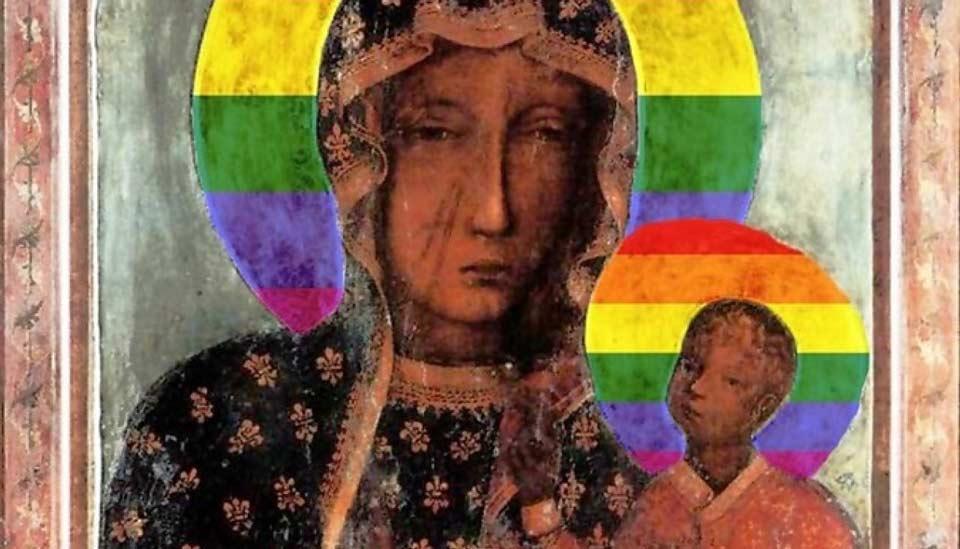
Image description: Disputed image of Virgin Mary with rainbow halo.
In April this year, Elzbieta Podlesna – an artist and activist from Poland, put up posters of the Virgin Mary against a rainbow-coloured halo.
Mikołaj Czerwiński, the Equal Treatment Coordinator from Amnesty International Poland said that a priest in Plock, a city in central Poland, referred to activities of the LGBTI community as one of the sins during Easter Week and this is what led to many activists sharing posters of the Virgin Mary surrounded by a rainbow coloured halo. Poland’s population is predominantly Catholic and its government has been known to be conservative. And given such dynamics, navigating the space for LGBTI movements can be tricky.
Poland's interior minister called the images "cultural barbarism” and Podlesna came under intense public scrutiny. But this wasn’t the worst of it. Multiple news reports stated that she received death threats.
Multiple news reports stated that Podlesna received death threats.
Jacek Dehnel, a polish writer and poet expressed no surprise. “LGBTI movements are always in a tricky position within a homophobic society and this is nothing new to us,” he explained. The incident was considered especially troublesome because it also violated the country’s blasphemy laws.
The law states “whoever offends religious feelings of other people by publicly insulting an object of religious cult or a place for public holding of religious ceremonies, is subject to a fine, restriction of liberty or loss of liberty for up to 2 years.” And accordingly, Podlesna was charged with ‘offending religious beliefs’ and now faces up to two years in prison if she is found guilty. Podlesna was detained and interrogated by the police last month.
Czerwiński called the charges “absurd”, further adding that an exercise of the freedom of expression should not be treated as a crime. As for where Podlesna’s case stands as of today, he said that she is now being put through “several legal proceedings” in what can be termed as “just another example of the constant harassment she faces simply for carrying out her peaceful activism.”
In 2017, Podlesna was one of 14 women who were attacked after unfurling a banner saying ‘Stop Fascism’ during The Independence Day March in Warsaw where far-right protesters had gathered calling for a ‘white Poland’.
Amnesty International too has strongly condemned the Polish establishment for curbing freedom of expression. And like Amnesty International, many in Poland publicly came out in support of Podlesna. Social media users too came together to condemn Podleśna's arrest. Many users shared the same LGBTI depiction of the Virgin Mary in solidarity with Podleśna.
LGBTI Rights in a Polish Society
Acknowledging the societal shift in Poland when it comes to LGBTI rights, Dehnel said that now, perhaps for the first time, a majority of its citizens are “for establishing civil partnerships and about 40% are for gay marriages.”
More notably, the country found its first openly gay MP last month when Robert Biedroń, an LGBTI activist and former mayor, was elected as Member of the European Parliament. And in the same month, the mayor of Warsaw signed an anti-discrimination declaration to support the city's LGBTI community.
Although, there is still room for improvement, especially so within the Law and Justice (PiS) party, Poland’s ruling party. Czerwiński explained that it is politicians of this party who condemned the pride march that was held in Warsaw a few days ago and also spread hateful messages about it.
The Church and the State
The troubles facing the LGBTI community in Poland has a lot to do with the fact that in Poland, there is no clear separation between the church and the state.
Poland is one of the signatories to a treaty with the Vatican and certain aspects of its societal life are governed by this agreement. Human Rights organizations, as well as UN bodies, noted that women in Poland face numerous obstacles in accessing abortion services. It has been documented that for years now, non-State actors, such as priests, interfere with access to legal and safe abortions.
It has been documented that for years now, non-State actors, such as priests, interfere with access to legal and safe abortions.
As for Podlesna’s case, Dehnel explained that what was surprising was not the fact that someone felt offended by that halo – as “taking an offence of the religious feelings” has been practised in attempts to block the freedom of speech for a long time – but how strict and brutal the police action was.
He called the harassment “deliberate” with an intention to harass the part of the community that “refuses to accept the hegemony of the joint rule of the right-wing Law and Justice party and the Catholic church.”
PiS came to power in 2015 banking on anti-immigrant sentiment. Since coming to power, PiS has been known to be the champion of ‘traditional family values’. It encouraged women to have more babies and introduced a handout of $130 per child. Funding for IVF treatment has been stopped. It also considered tightening restrictions on abortions.
In light of the elections to the EU parliament held in the last week of May, the ruling party used discriminatory rhetoric against LGBTI people as a tool, Czerwiński explained.
And the trigger that could have resulted in the targeting of the community this time around, experts believe, might have been a film titled ‘Tell No One’ that detailed testimonies of victims of paedophilia in the Polish Catholic Church. The film was released in the days before the EU elections.
“The response from the so-called pro-family and nationalist groups was that the problem was of ‘homosexual propaganda’ that was making priests behave in a certain manner,” explained Barbora Cernusakova, a researcher at Amnesty International’s EU team. “This completely twisted the narrative in society,” she added.
Elaborating on the same issue, Dehnel says that there are conspiracy theories about a “lavender lobby of homosexual clergy” that abuses children and that the church is being persecuted for this.
“The fact is that there is no connection between homosexuality and child abuse,” he added, stressing that what the Polish church, much like churches across the world, is rightly blamed for is the constant protection it gives to the perpetrators of such crimes and its aggression towards the victims.
The troubles facing the LGBTI community are widespread. But so is hope.
A number of left-leaning political parties have expressed support for LGBTI rights and many rights organisations like Campaign Against Homophobia and Lambda Warszawa have also aggressively campaigned for the same. Ever since 2001, an equality parade has been held in Warsaw. Even in the years when permissions to organise such marches were denied, people still marched in the streets.
Ever since 2001, an equality parade has been held in Warsaw.
Just a few days ago, the annual march was held in Warsaw with about 80,000 supporters and for the first time, it was opened by Warsaw’s president who also declared that everyone should respect minority rights. “It’s really important for me that Warsaw be open, that Warsaw be tolerant,” he told the crowd. About 10,000 people also participated in the march in Krakow - the first time that a city outside the capital recorded such numbers.
The marches were “happy and safe” Czerwiński said.
- 5820 views






Add new comment